Emotional Intelligence: Factors, Leadership, and Learning Essay
VerifiedAdded on 2023/06/03
|7
|1540
|274
Essay
AI Summary
This essay delves into the concept of emotional intelligence (EI), emphasizing its crucial role in effective leadership. It defines EI as the ability to manage one's own emotions and those of others, highlighting traits such as self-awareness, self-management, empathy, effective communication, and relationship management. The essay explores each of these factors in detail, explaining their significance and providing examples of how they contribute to successful leadership. Furthermore, it addresses the question of whether EI is innate or learned, presenting evidence that EI can be developed through learning and training. The essay concludes by emphasizing the importance of observing an individual's behavior in various situations to assess their level of emotional intelligence. The essay utilizes references to support its arguments.
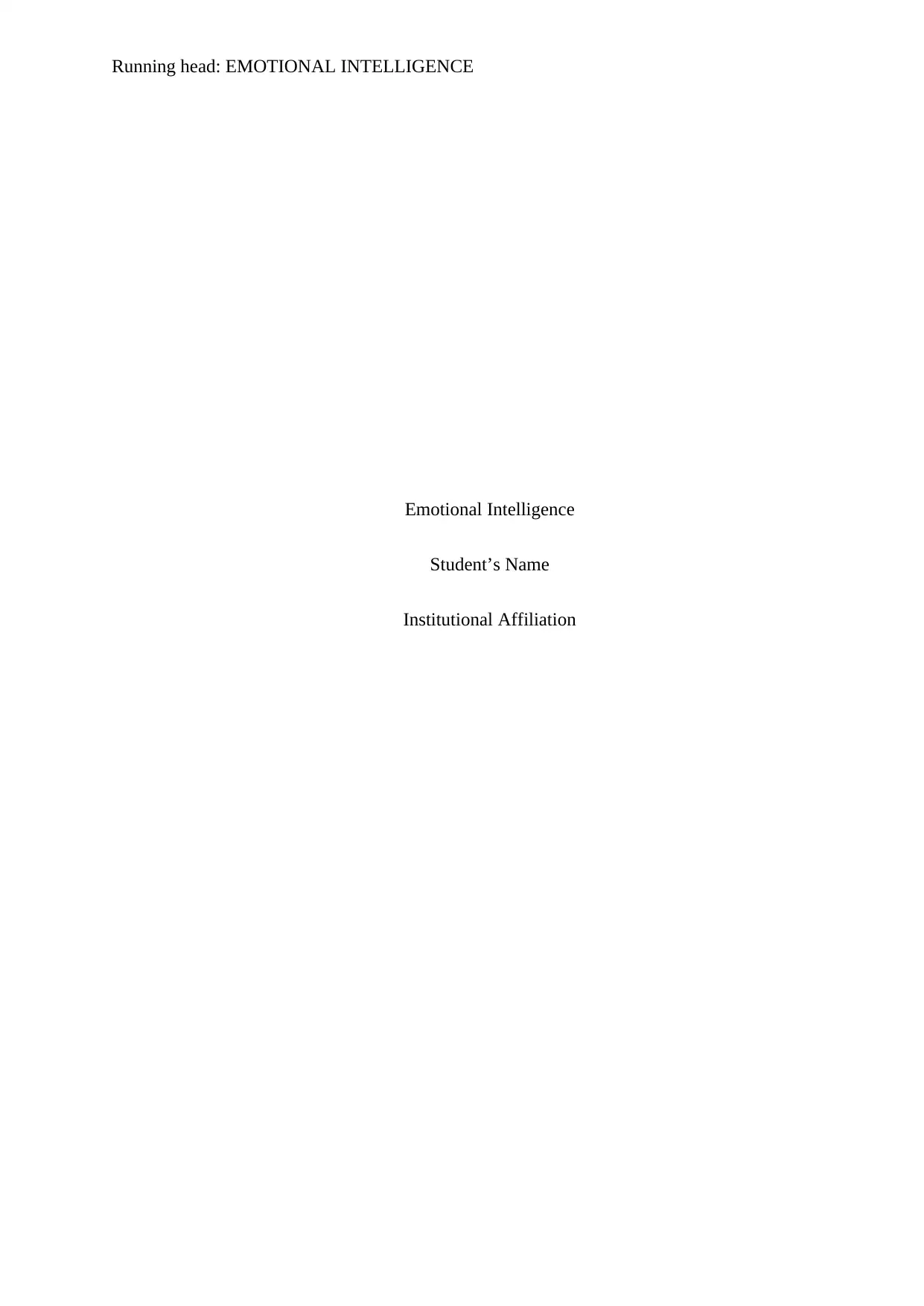
Running head: EMOTIONAL INTELLIGENCE
Emotional Intelligence
Student’s Name
Institutional Affiliation
Emotional Intelligence
Student’s Name
Institutional Affiliation
Paraphrase This Document
Need a fresh take? Get an instant paraphrase of this document with our AI Paraphraser
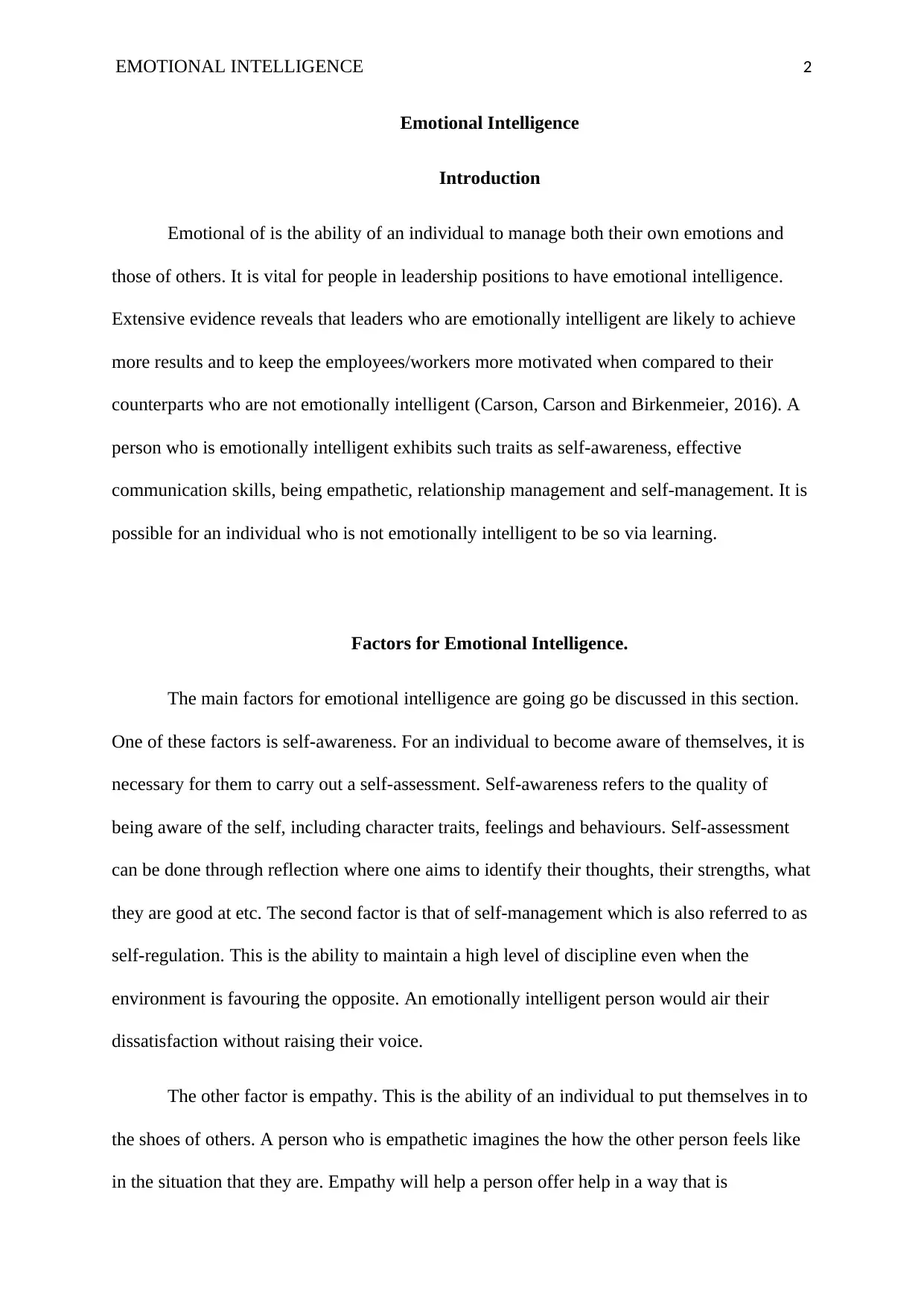
EMOTIONAL INTELLIGENCE 2
Emotional Intelligence
Introduction
Emotional of is the ability of an individual to manage both their own emotions and
those of others. It is vital for people in leadership positions to have emotional intelligence.
Extensive evidence reveals that leaders who are emotionally intelligent are likely to achieve
more results and to keep the employees/workers more motivated when compared to their
counterparts who are not emotionally intelligent (Carson, Carson and Birkenmeier, 2016). A
person who is emotionally intelligent exhibits such traits as self-awareness, effective
communication skills, being empathetic, relationship management and self-management. It is
possible for an individual who is not emotionally intelligent to be so via learning.
Factors for Emotional Intelligence.
The main factors for emotional intelligence are going go be discussed in this section.
One of these factors is self-awareness. For an individual to become aware of themselves, it is
necessary for them to carry out a self-assessment. Self-awareness refers to the quality of
being aware of the self, including character traits, feelings and behaviours. Self-assessment
can be done through reflection where one aims to identify their thoughts, their strengths, what
they are good at etc. The second factor is that of self-management which is also referred to as
self-regulation. This is the ability to maintain a high level of discipline even when the
environment is favouring the opposite. An emotionally intelligent person would air their
dissatisfaction without raising their voice.
The other factor is empathy. This is the ability of an individual to put themselves in to
the shoes of others. A person who is empathetic imagines the how the other person feels like
in the situation that they are. Empathy will help a person offer help in a way that is
Emotional Intelligence
Introduction
Emotional of is the ability of an individual to manage both their own emotions and
those of others. It is vital for people in leadership positions to have emotional intelligence.
Extensive evidence reveals that leaders who are emotionally intelligent are likely to achieve
more results and to keep the employees/workers more motivated when compared to their
counterparts who are not emotionally intelligent (Carson, Carson and Birkenmeier, 2016). A
person who is emotionally intelligent exhibits such traits as self-awareness, effective
communication skills, being empathetic, relationship management and self-management. It is
possible for an individual who is not emotionally intelligent to be so via learning.
Factors for Emotional Intelligence.
The main factors for emotional intelligence are going go be discussed in this section.
One of these factors is self-awareness. For an individual to become aware of themselves, it is
necessary for them to carry out a self-assessment. Self-awareness refers to the quality of
being aware of the self, including character traits, feelings and behaviours. Self-assessment
can be done through reflection where one aims to identify their thoughts, their strengths, what
they are good at etc. The second factor is that of self-management which is also referred to as
self-regulation. This is the ability to maintain a high level of discipline even when the
environment is favouring the opposite. An emotionally intelligent person would air their
dissatisfaction without raising their voice.
The other factor is empathy. This is the ability of an individual to put themselves in to
the shoes of others. A person who is empathetic imagines the how the other person feels like
in the situation that they are. Empathy will help a person offer help in a way that is
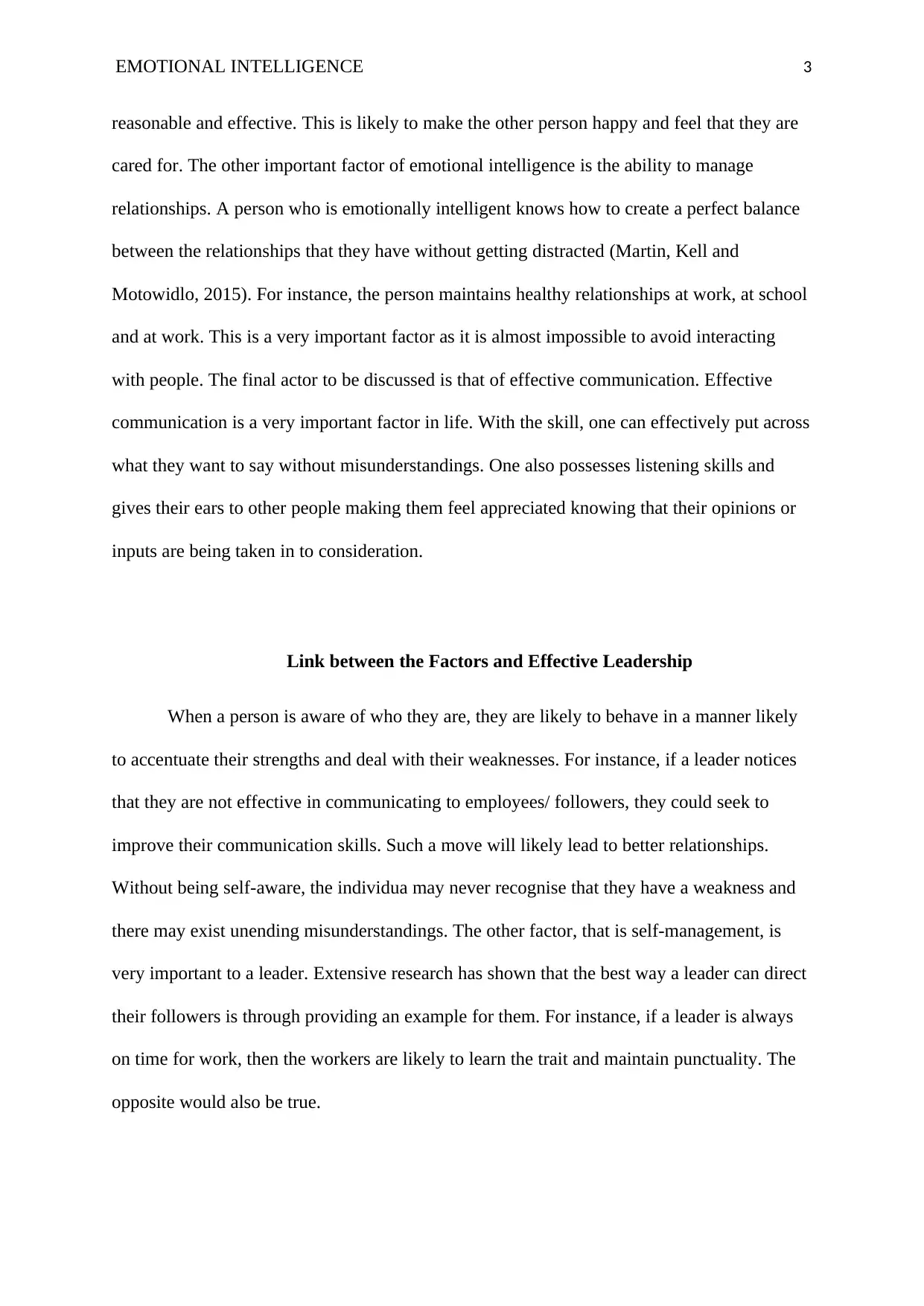
EMOTIONAL INTELLIGENCE 3
reasonable and effective. This is likely to make the other person happy and feel that they are
cared for. The other important factor of emotional intelligence is the ability to manage
relationships. A person who is emotionally intelligent knows how to create a perfect balance
between the relationships that they have without getting distracted (Martin, Kell and
Motowidlo, 2015). For instance, the person maintains healthy relationships at work, at school
and at work. This is a very important factor as it is almost impossible to avoid interacting
with people. The final actor to be discussed is that of effective communication. Effective
communication is a very important factor in life. With the skill, one can effectively put across
what they want to say without misunderstandings. One also possesses listening skills and
gives their ears to other people making them feel appreciated knowing that their opinions or
inputs are being taken in to consideration.
Link between the Factors and Effective Leadership
When a person is aware of who they are, they are likely to behave in a manner likely
to accentuate their strengths and deal with their weaknesses. For instance, if a leader notices
that they are not effective in communicating to employees/ followers, they could seek to
improve their communication skills. Such a move will likely lead to better relationships.
Without being self-aware, the individua may never recognise that they have a weakness and
there may exist unending misunderstandings. The other factor, that is self-management, is
very important to a leader. Extensive research has shown that the best way a leader can direct
their followers is through providing an example for them. For instance, if a leader is always
on time for work, then the workers are likely to learn the trait and maintain punctuality. The
opposite would also be true.
reasonable and effective. This is likely to make the other person happy and feel that they are
cared for. The other important factor of emotional intelligence is the ability to manage
relationships. A person who is emotionally intelligent knows how to create a perfect balance
between the relationships that they have without getting distracted (Martin, Kell and
Motowidlo, 2015). For instance, the person maintains healthy relationships at work, at school
and at work. This is a very important factor as it is almost impossible to avoid interacting
with people. The final actor to be discussed is that of effective communication. Effective
communication is a very important factor in life. With the skill, one can effectively put across
what they want to say without misunderstandings. One also possesses listening skills and
gives their ears to other people making them feel appreciated knowing that their opinions or
inputs are being taken in to consideration.
Link between the Factors and Effective Leadership
When a person is aware of who they are, they are likely to behave in a manner likely
to accentuate their strengths and deal with their weaknesses. For instance, if a leader notices
that they are not effective in communicating to employees/ followers, they could seek to
improve their communication skills. Such a move will likely lead to better relationships.
Without being self-aware, the individua may never recognise that they have a weakness and
there may exist unending misunderstandings. The other factor, that is self-management, is
very important to a leader. Extensive research has shown that the best way a leader can direct
their followers is through providing an example for them. For instance, if a leader is always
on time for work, then the workers are likely to learn the trait and maintain punctuality. The
opposite would also be true.
⊘ This is a preview!⊘
Do you want full access?
Subscribe today to unlock all pages.

Trusted by 1+ million students worldwide
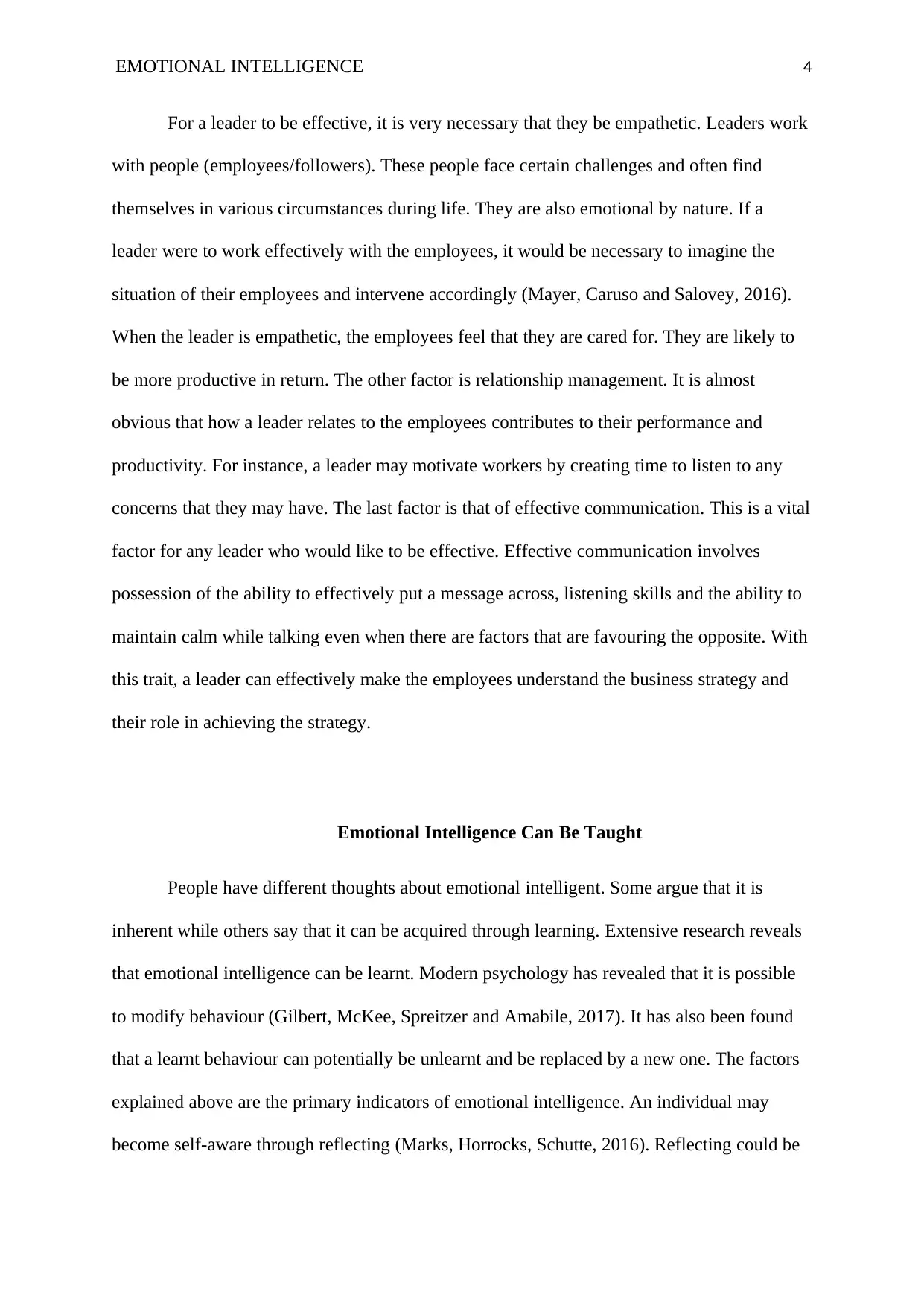
EMOTIONAL INTELLIGENCE 4
For a leader to be effective, it is very necessary that they be empathetic. Leaders work
with people (employees/followers). These people face certain challenges and often find
themselves in various circumstances during life. They are also emotional by nature. If a
leader were to work effectively with the employees, it would be necessary to imagine the
situation of their employees and intervene accordingly (Mayer, Caruso and Salovey, 2016).
When the leader is empathetic, the employees feel that they are cared for. They are likely to
be more productive in return. The other factor is relationship management. It is almost
obvious that how a leader relates to the employees contributes to their performance and
productivity. For instance, a leader may motivate workers by creating time to listen to any
concerns that they may have. The last factor is that of effective communication. This is a vital
factor for any leader who would like to be effective. Effective communication involves
possession of the ability to effectively put a message across, listening skills and the ability to
maintain calm while talking even when there are factors that are favouring the opposite. With
this trait, a leader can effectively make the employees understand the business strategy and
their role in achieving the strategy.
Emotional Intelligence Can Be Taught
People have different thoughts about emotional intelligent. Some argue that it is
inherent while others say that it can be acquired through learning. Extensive research reveals
that emotional intelligence can be learnt. Modern psychology has revealed that it is possible
to modify behaviour (Gilbert, McKee, Spreitzer and Amabile, 2017). It has also been found
that a learnt behaviour can potentially be unlearnt and be replaced by a new one. The factors
explained above are the primary indicators of emotional intelligence. An individual may
become self-aware through reflecting (Marks, Horrocks, Schutte, 2016). Reflecting could be
For a leader to be effective, it is very necessary that they be empathetic. Leaders work
with people (employees/followers). These people face certain challenges and often find
themselves in various circumstances during life. They are also emotional by nature. If a
leader were to work effectively with the employees, it would be necessary to imagine the
situation of their employees and intervene accordingly (Mayer, Caruso and Salovey, 2016).
When the leader is empathetic, the employees feel that they are cared for. They are likely to
be more productive in return. The other factor is relationship management. It is almost
obvious that how a leader relates to the employees contributes to their performance and
productivity. For instance, a leader may motivate workers by creating time to listen to any
concerns that they may have. The last factor is that of effective communication. This is a vital
factor for any leader who would like to be effective. Effective communication involves
possession of the ability to effectively put a message across, listening skills and the ability to
maintain calm while talking even when there are factors that are favouring the opposite. With
this trait, a leader can effectively make the employees understand the business strategy and
their role in achieving the strategy.
Emotional Intelligence Can Be Taught
People have different thoughts about emotional intelligent. Some argue that it is
inherent while others say that it can be acquired through learning. Extensive research reveals
that emotional intelligence can be learnt. Modern psychology has revealed that it is possible
to modify behaviour (Gilbert, McKee, Spreitzer and Amabile, 2017). It has also been found
that a learnt behaviour can potentially be unlearnt and be replaced by a new one. The factors
explained above are the primary indicators of emotional intelligence. An individual may
become self-aware through reflecting (Marks, Horrocks, Schutte, 2016). Reflecting could be
Paraphrase This Document
Need a fresh take? Get an instant paraphrase of this document with our AI Paraphraser
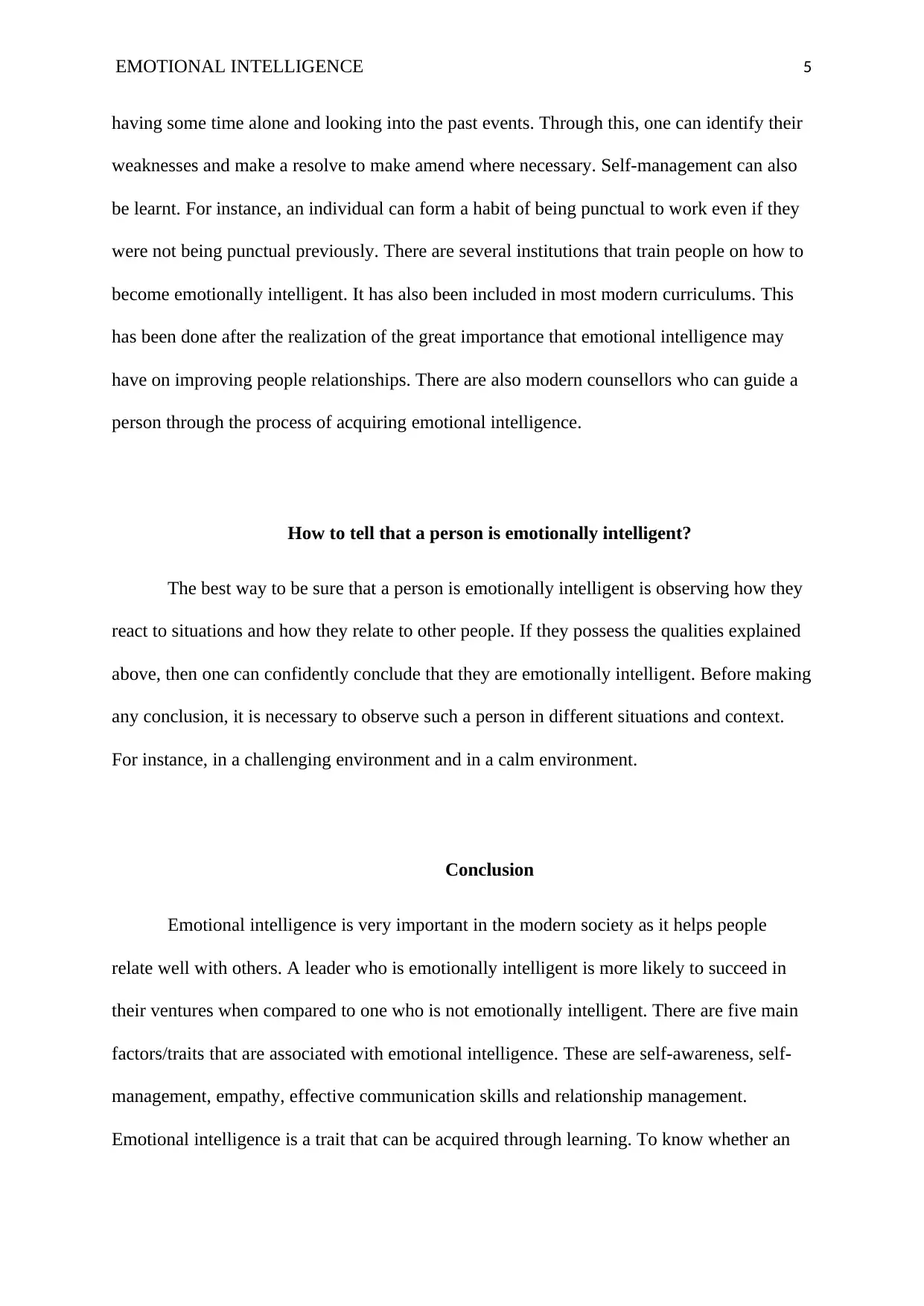
EMOTIONAL INTELLIGENCE 5
having some time alone and looking into the past events. Through this, one can identify their
weaknesses and make a resolve to make amend where necessary. Self-management can also
be learnt. For instance, an individual can form a habit of being punctual to work even if they
were not being punctual previously. There are several institutions that train people on how to
become emotionally intelligent. It has also been included in most modern curriculums. This
has been done after the realization of the great importance that emotional intelligence may
have on improving people relationships. There are also modern counsellors who can guide a
person through the process of acquiring emotional intelligence.
How to tell that a person is emotionally intelligent?
The best way to be sure that a person is emotionally intelligent is observing how they
react to situations and how they relate to other people. If they possess the qualities explained
above, then one can confidently conclude that they are emotionally intelligent. Before making
any conclusion, it is necessary to observe such a person in different situations and context.
For instance, in a challenging environment and in a calm environment.
Conclusion
Emotional intelligence is very important in the modern society as it helps people
relate well with others. A leader who is emotionally intelligent is more likely to succeed in
their ventures when compared to one who is not emotionally intelligent. There are five main
factors/traits that are associated with emotional intelligence. These are self-awareness, self-
management, empathy, effective communication skills and relationship management.
Emotional intelligence is a trait that can be acquired through learning. To know whether an
having some time alone and looking into the past events. Through this, one can identify their
weaknesses and make a resolve to make amend where necessary. Self-management can also
be learnt. For instance, an individual can form a habit of being punctual to work even if they
were not being punctual previously. There are several institutions that train people on how to
become emotionally intelligent. It has also been included in most modern curriculums. This
has been done after the realization of the great importance that emotional intelligence may
have on improving people relationships. There are also modern counsellors who can guide a
person through the process of acquiring emotional intelligence.
How to tell that a person is emotionally intelligent?
The best way to be sure that a person is emotionally intelligent is observing how they
react to situations and how they relate to other people. If they possess the qualities explained
above, then one can confidently conclude that they are emotionally intelligent. Before making
any conclusion, it is necessary to observe such a person in different situations and context.
For instance, in a challenging environment and in a calm environment.
Conclusion
Emotional intelligence is very important in the modern society as it helps people
relate well with others. A leader who is emotionally intelligent is more likely to succeed in
their ventures when compared to one who is not emotionally intelligent. There are five main
factors/traits that are associated with emotional intelligence. These are self-awareness, self-
management, empathy, effective communication skills and relationship management.
Emotional intelligence is a trait that can be acquired through learning. To know whether an

EMOTIONAL INTELLIGENCE 6
individual is emotionally intelligent or not, the best technique is to observe their behaviour in
different situations/environments.
individual is emotionally intelligent or not, the best technique is to observe their behaviour in
different situations/environments.
⊘ This is a preview!⊘
Do you want full access?
Subscribe today to unlock all pages.

Trusted by 1+ million students worldwide
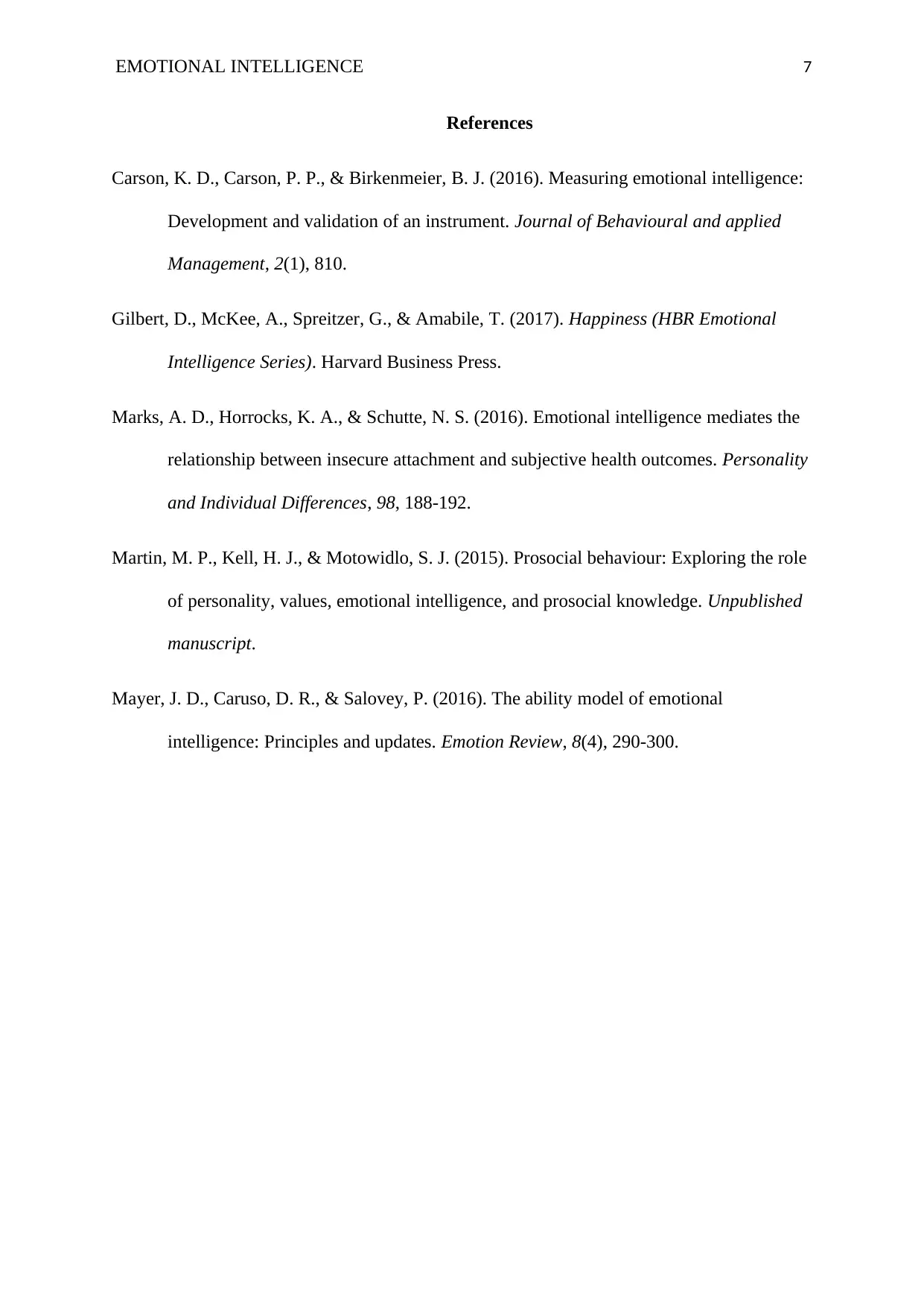
EMOTIONAL INTELLIGENCE 7
References
Carson, K. D., Carson, P. P., & Birkenmeier, B. J. (2016). Measuring emotional intelligence:
Development and validation of an instrument. Journal of Behavioural and applied
Management, 2(1), 810.
Gilbert, D., McKee, A., Spreitzer, G., & Amabile, T. (2017). Happiness (HBR Emotional
Intelligence Series). Harvard Business Press.
Marks, A. D., Horrocks, K. A., & Schutte, N. S. (2016). Emotional intelligence mediates the
relationship between insecure attachment and subjective health outcomes. Personality
and Individual Differences, 98, 188-192.
Martin, M. P., Kell, H. J., & Motowidlo, S. J. (2015). Prosocial behaviour: Exploring the role
of personality, values, emotional intelligence, and prosocial knowledge. Unpublished
manuscript.
Mayer, J. D., Caruso, D. R., & Salovey, P. (2016). The ability model of emotional
intelligence: Principles and updates. Emotion Review, 8(4), 290-300.
References
Carson, K. D., Carson, P. P., & Birkenmeier, B. J. (2016). Measuring emotional intelligence:
Development and validation of an instrument. Journal of Behavioural and applied
Management, 2(1), 810.
Gilbert, D., McKee, A., Spreitzer, G., & Amabile, T. (2017). Happiness (HBR Emotional
Intelligence Series). Harvard Business Press.
Marks, A. D., Horrocks, K. A., & Schutte, N. S. (2016). Emotional intelligence mediates the
relationship between insecure attachment and subjective health outcomes. Personality
and Individual Differences, 98, 188-192.
Martin, M. P., Kell, H. J., & Motowidlo, S. J. (2015). Prosocial behaviour: Exploring the role
of personality, values, emotional intelligence, and prosocial knowledge. Unpublished
manuscript.
Mayer, J. D., Caruso, D. R., & Salovey, P. (2016). The ability model of emotional
intelligence: Principles and updates. Emotion Review, 8(4), 290-300.
1 out of 7
Related Documents
Your All-in-One AI-Powered Toolkit for Academic Success.
+13062052269
info@desklib.com
Available 24*7 on WhatsApp / Email
![[object Object]](/_next/static/media/star-bottom.7253800d.svg)
Unlock your academic potential
Copyright © 2020–2026 A2Z Services. All Rights Reserved. Developed and managed by ZUCOL.




